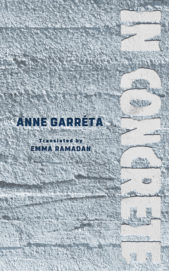Anne Garréta
Translated by Emma Ramadan
Deep Vellum Publishing ($15.95)
by Jeff Bursey
 In Concrete has a simple plot: parents of two precocious children purchase a concrete mixer to restore a hovel in the country inherited by the father from a long-ago acquaintance and, in the course of the renovations, someone ends up encased in concrete. But plot is the least promising feature of Oulipian Anne Garréta’s latest novel to be translated into English. After classifying the book as “a fable, a feminist inversion of a domestic drama,” among other things, translator Emma Ramadan concludes in her Note at the end of the text that In Concrete “is, above all, an exploration of language.” The statement acknowledges that the actuality of the events (which are narrated by Fignole, a “12-year-old” of unspecified gender), is secondary to how they’re told, which is by turns straightforward and outlandish, scatological and impish.
In Concrete has a simple plot: parents of two precocious children purchase a concrete mixer to restore a hovel in the country inherited by the father from a long-ago acquaintance and, in the course of the renovations, someone ends up encased in concrete. But plot is the least promising feature of Oulipian Anne Garréta’s latest novel to be translated into English. After classifying the book as “a fable, a feminist inversion of a domestic drama,” among other things, translator Emma Ramadan concludes in her Note at the end of the text that In Concrete “is, above all, an exploration of language.” The statement acknowledges that the actuality of the events (which are narrated by Fignole, a “12-year-old” of unspecified gender), is secondary to how they’re told, which is by turns straightforward and outlandish, scatological and impish.
Ramadan’s statements aren’t meant to address all the content of the novel. While language exploration is evident throughout—with twistings like “muddernized” and “may swell begin at the beginning” functioning as approximations of heard expressions, and with neologisms arising in phrases like “monstrous scatastrophe”—there is much more going on. Two aspects stand out: comedy and war.
Garréta has written what is, in part, a slapstick novel. The father, Philippe, is a fixer-upper of engines—a hoarder, to be blunt, of rusted machinery—who regularly electrocutes himself, suffers physical damage, and fails to attend to the finishing touches of jobs. That is detrimental to the restoration of the inherited homestead as well as to his children, Fignole and the younger Angélique, but essential for the comedy. His wiser children are aware of this and try to prevent or fix his mistakes. But for slapstick to be successful it requires a certain dimness in at least one character and Philippe must persist as the prime source of the mishaps.
Other forms of comedic writing occur in tart one-liners. When referring to the hoarding done by cousins of toilet bowls—a family trait or the result of severe historical impoverishment?—Fignole tartly says, “They flatter themselves thinking they can resell everything at a profit. That somewhere the secondhand shitter market is booming.” That’s a fine short line. Garréta is also adept at portraying physical comedy through form, specifically seen when a washboiler filled with liquid concrete drops “like a bomb.” To convey this, the prose is broken not only into shorter paragraphs than usual, but indented further and further, sometimes one word to a line, in a way that forces readers to race across and up and down the page, capturing some of the speed and visual chaos of what’s happening. Fignole (whose name, “like Guignol and his band,” is an allusion to Louis-Ferdinand Céline, who also played with the French language and argot) stops to criticize this layout: “And what about the punkchewation, huh!?” Self-referentiality is key here, and is, if you will, a meta-comedic touch, as is the sentence, “We’re like rats in a lab experiment,” bringing to mind the definition of Oulipians offered by literary critic Raymond Queneau: “rats who must build the labyrinth from which they propose to escape.”
As for war, it’s everywhere. From references to the games children play, through historical markers (Agincourt, the Boer War, the Maginot Line), to the last name of their father, Oberkampf, bestowed on him in a “penal colony where the homeland bred cannon fodder” after he and his family lost each other “during one of those lurid debacles that seem to happen so often throughout History. But we don’t know which debacle . . . There’ve been so many.” There’s nothing inherently funny about war, and as In Concrete comes to a close, the lighthearted top layer slips, the lens moving out from a child’s view to encompass the First and Second World Wars. Readers willing to dive into Garréta’s games with gender, language, and form may find content of a more serious nature underlying the comedic surface.
